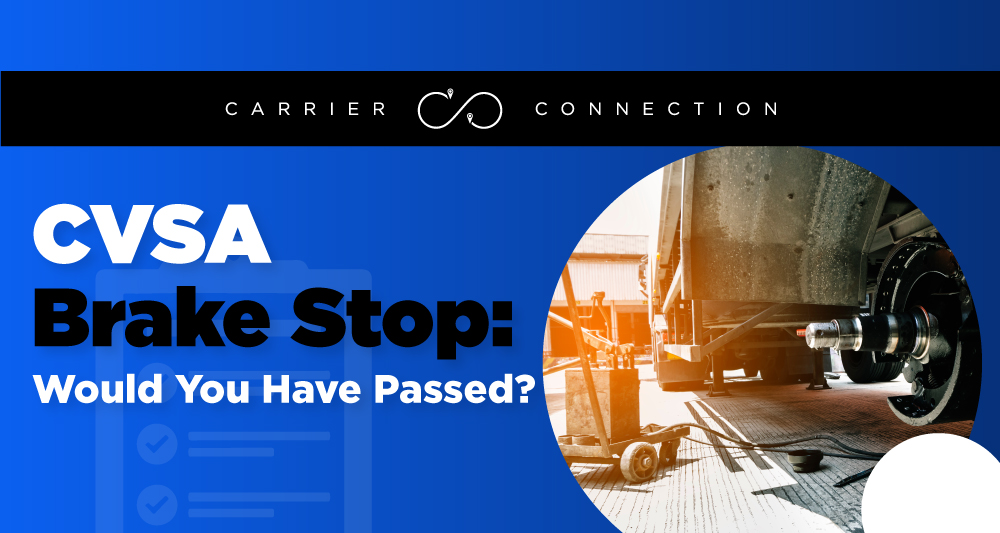![]()
On April 19, 773 carriers in the US, Mexico and Canada had their haul come to a grinding halt for, ironically, bad brakes.
In an unannounced brake enforcement event, the CVSA inspected 6,829 commercial motor vehicles to gather brake lining/pad violation data. In all three countries surveyed, more than 1 in 10 carriers were sidelined until violations were remedied.
With many carriers being sidelined, you might wonder: Would your vehicle have met a similar fate?
Here’s what caused most CVSA officers to pump the brakes for these carriers, and what you can do to identify and fix them:
-
Brake Out of Adjustment
When your brakes are out of adjustment, it’s likely because of two scenarios:
- If your brakes are adjusted too tightly, they can exert pressure even when not in use. This can lead to brake overuse, resulting in unnecessary drag and damage.
- If your brakes are not adjusted tightly enough, there will be insufficient contact between the brakes and the drum, resulting in a loss of braking power.
How to spot out of adjustment brakes: Frequent inspections are critical to ensure your brakes stay in proper adjustment. For over-adjustment, look for signs of excessive heat or premature wear. You may also notice a slight pull when pressing on the accelerator.
For under-adjusted brakes, longer stopping distances and a brake pedal that feels ‘spongey’ are tell-tale signs of an issue. Upon inspection, you may also notice uneven wear on the brake drum caused by inconsistent contact.
When you’ve spotted these issues, be sure to have your brakes evaluated and repaired by a professional as soon as possible.
-
Air Leak in Air Brake System
If there is an audible air leak in a brake chamber, you can be certain that you have an issue with the air brake system of your truck. Air leaks can be caused by a variety of malfunctions:
- If your brake diaphragm becomes torn or punctured, air can escape and influence the responsiveness of your brakes. These holes are typically the result of everyday wear and tear.
- Air leaks can also occur at fittings or connections in the air brakes. Eventually, connections can loosen or become corroded over time and begin to leak.
- Seal failure can also result in escaping air that damages your brakes. These damaged seals are usually related to the push rod or chamber housing seal.
- Finally, the control valves of an air brake system can also become damaged and produce air leaks.
How to spot holes in your air brake system: Inspecting your air brake systems is important to maintaining your truck’s brake health. When inspecting your air brake systems, first check the air pressure. If the pressure is unusually low, evaluate the diaphragm, seals, control valves, and fittings for signs of leakage.
Catching leaks early can make all the difference for your safety. If possible, immediately make repairs to your air brake system if leaks are found.
-
Defective Linings or Pads
Lining or pad defects happen naturally over the course of a brake’s life. Though wear and tear are the most likely culprits, pad defects can also arise from oils, brake fluid, or dirt contamination. If you’re one to haul through hot climates, your brakes may also be subject to quicker decay.
How to spot defective linings: Defective brake pads will almost always be making an unusual noise. If you’re rig is squeaking, screeching, or scraping, the issue may be worn brake pads. If in doubt, inspect your brake pads for evidence of decay, such as unusual thinning, cracks, or missing entire chunks.
It seems like brakes never get a break. A lot can go wrong with one of the most important functions of your rig. Take time to frequently inspect your brakes; after all, you never know when a surprise inspection may be around the corner.
The England Carrier Services (ECS) division offers various services for carriers ranging from maintenance to support. As ECS members, carriers have access to nationwide discounts on fuel and tires from dedicated team members committed to finding the best price. ECS also provides factoring services with benefits such as same-day funding to a bank account or fuel card. These options allow carriers the freedom to focus on growing their business while saving time and money.



